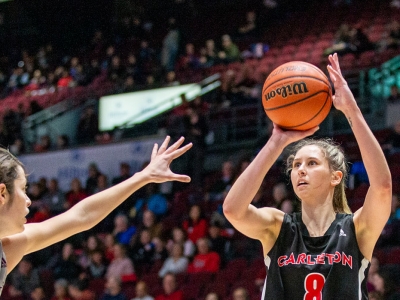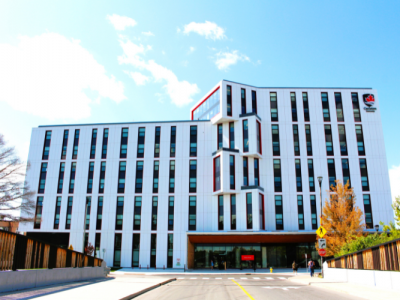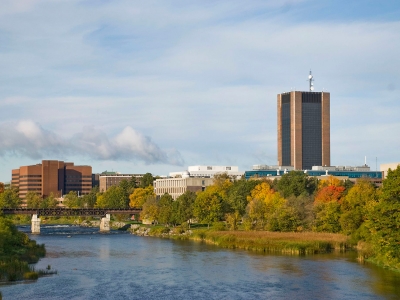Carleton University’s Mark Boulay and Adrian Chan have received nearly $9.3 million from the Canada Foundation for Innovation’s (CFI) Innovation Fund. Mark Boulay’s project will continue to support research into dark matter exploration at SNOLAB. Adrian Chan’s project will create a living lab focusing on accessibility with a view to creating an inclusive and accessible Canada.
In addition, Razvan Gornea, professor in the Department of Physics, will be working on a CFI funded project led by the University of British Columbia entitled Enabling the search for neutrinoless double-beta decays in Xe-136 with nEXO.
“Carleton would like to thank our partners and CFI for its vision in further strengthening this ongoing Canadian physics project and for funding the new Abilities Living Laboratory (ALL),” said Rafik Goubran, vice-president (Research and International). “This major investment in innovative, world-class research will benefit all Canadians.”
Boulay, professor in the Department of Physics, and his partners at the University of Alberta, Laurentian University, Queen’s University, Canadian Nuclear Laboratories, SNOLAB and TRIUMF are enhancing Canada’s leadership in dark matter searches by enabling next-generation liquid argon experiments at SNOLAB. Liquid argon’s unique properties allow strong background suppression, enabling very large and sensitive detectors.
The mystery of dark matter has been around since the 1930s, when it became apparent that the normal matter we know of, made up of mostly protons and neutrons, can only account for about five per cent of the universe. Searching for dark matter particles by looking for their interaction with atomic nuclei is now an international scientific priority—understanding the nature of dark matter is one of the most important unsolved problems in science.
“This funding allows us to continue the search for the elusive dark matter that makes up most of the universe but has not yet been directly observed,” said Boulay. “It enables improvements to the DEAP-3600 experiment at SNOLAB—currently the world’s most sensitive liquid argon dark matter detector—and the development of an even larger next-generation experiment, Darkside-20k.”
Located two kilometres below the surface in Sudbury, Ont., SNOLAB is the deepest cleanest lab in the world. It provides an ideal low background environment for the study of extremely rare physical interactions. SNOLAB’s science program focuses on astroparticle physics, specifically neutrino and dark matter studies, though its unique location is also well-suited to biology and geology experiments. SNOLAB facilitates world-class research, trains highly qualified personnel and inspires the next generation of scientists.
Chan, director of the Research and Education in Accessibility, Design, and Innovation (READi) training program, and his partners at the University of Ottawa will use the funding to support ALL at Carleton. ALL brings together some of Canada’s top minds in science, engineering, design, health, social sciences and the humanities to create innovative community systems that enable a fully inclusive and accessible Canada.
“I’m thrilled about this opportunity,” said Chan. “Carleton has engaged in many projects that have contributed to a more accessible society for persons with disabilities. ALL will provide cutting-edge technology and infrastructure to accelerate accessibility research.”
It is anticipated that this research program will lead to the design and development of new assistive and rehabilitation devices, public environments and facilities, and experiences that are more accessible and inclusive.
About CFI
For more than 20 years, CFI has been giving researchers the tools they need to think big and innovate. Fostering a robust innovation system in Canada translates into jobs and new enterprises, better health, cleaner environments and, ultimately, vibrant communities. By investing in state-of-the-art facilities and equipment in Canada’s universities, colleges, research hospitals and non-profit research institutions, CFI also helps to attract and retain the world’s top talent, to train the next generation of researchers and to support world-class research that strengthens the economy and improves the quality of life for all Canadians.
Media Contact
Steven Reid
Media Relations Officer
Carleton University
613-265-6613
Steven.Reid3@carleton.ca
Follow us on Twitter: www.twitter.com/Cunewsroom
COVID 19 Updates: https://newsroom.carleton.ca/coronavirus-covid-19/messages/
Friday, March 5, 2021 in News Releases
Share: Twitter, Facebook



